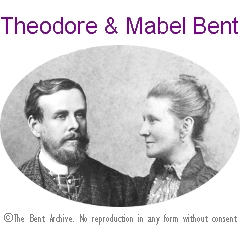“Like most travellers, this lady has found that the less she and her nomad husband see of spirits and wine the better, and so with the exception of a little brandy for medicinal purposes, the whole party travel on tea, beef essence, and condensed milk…”
To mark Mabel Bent’s birthday (28 January 1847) this year (2022), let’s read more from a rare article on her from an arcane newspaper – The Newry Telegraph, 3rd January 1895, published by an unknown publisher in Newry, Co. Down, Northern Ireland. It seems that it is an original editorial by an unknown author and not a piece syndicated from any other contemporary English source. There is every chance that it was written, or co-written, by Mabel’s sister Frances Maria Hobson, wife of the Rector of Portadown (a corner of that devout triangle, Newry, Portadown, Armagh. The wagging finger to the intemperate above is a clue perhaps, ironic rather as Theodore’s fortunes derived in part from brewing!).
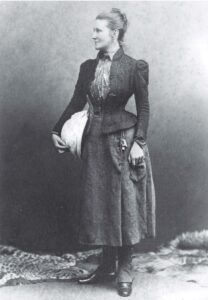
The featured photo, probably from Cape Town in 1891, shows Mabel in her prime and on her way to explore the ruins of Great Zimbabwe for Cecil Rhodes. Mabel’s confident air presages the Bents’ imminent fame as they join the cadre of the nation’s most popular and best-known adventurers. Their work in the Eastern Mediterranean is behind them, their celebrated Arabian expeditions ahead. Thus this article in The Newry Telegraph that follows reflects this prestige awaiting Mabel in 1895 perfectly, as well, of course, as the attitudes and jingoism of the day. And no excuse is ever needed for an oblique reference to another extraordinary traveller, Raymonde Bonnetain.
So, without further exposition, we join parlour-readers, heads and arms on their antimacassars, of The Newry Telegraph for Thursday, 3rd January 1895:

“Mrs Theodore Bent – The Queen of Explorers: Curious as it may seem, foreign exploration is one of the paths where the most feminine women have followed the example set them by their husbands and brothers. Of course, this has been especially the case in every kind of missionary enterprise, and one has only to recall the achievements of Lady Baker, Lady Burdon, Mme Dieu la Loy [sic], Mrs Peary, and more recently Mme Bonnetain note 1 , to prove that even great explorers have not hesitated to take with them on their perilous journeys those whom they had chosen for their life companions.
The subject of our sketch, Mrs. Theodore Bent, is a striking example of all a woman can do in the way of cheerful endurance and intelligent observation. Her name is less well-known than that of her husband, one of the most distinguished Fellows of the Royal Geographical Society, for, as she sometimes observes, ‘There is not ink enough in a family for two’, but the valuable additions to exploration literature published by Mr Bent owe not a little of their interest to his wife, for she keeps careful notes of everything that occurs during their journeys note 2 , and, when any excavations are to be done, generally takes charge of one party whilst her husband looks after another.
Mrs Bent, who is a light, graceful-looking woman, well-known in the cultured portion of London Society, belongs to an Irish family, famous in the annals of County Wexford, the Hall-Dares of Newton-Barry; she rode almost before she could walk, and early displayed remarkable pedestrian powers.
During the last ten years Mr and Mrs Bent have together achieved twelve exploration expeditions in some of the roughest and least known corners of Southern Asia, that vast and mysterious domain of which the world even now knows little. They began their travels by an expedition to the less well-known islands of Greece, and while there made some interesting archaeological discoveries; this first attempt taught them a great deal, and now Mr H M Stanley himself could not rival Mrs Bent as organiser and manger of an exploration party, for long experience has shown her what to avoid, and narrowed down her list of absolutely indispensable necessaries to a small compass.
It is interesting to note that Mr Bent’s book on Mashonaland was one of the first works published on that now much-debated portion of our Colonial Empire.
Of late years Arabia has become to both husband and wife the most interesting portion of the universe. There is probably no place in the world of which so little is known, and which is more full of practical dangers to exploring Europeans, for the native population, though civilised after a fashion, are extremely cunning and dishonest, and have a great hatred and contempt for anything they don’t understand.
Nowadays so much is talked about rational dress, cycling costumes, and the relative value of a divided skirt and knickerbockers, that it is interesting to know that Mrs Bent’s ideas on the subject are simple and the result of long experience. Her costume never varies, for she has found the same kind of dress equally useful in South Africa, Arabia, and the Isles of Greece. Her outfit, which is very pretty and even conventional, consists of a tweed coat and skirt coming down below the knees, breeches, gaiters, and stout shoes. The skirt is full, being pleated; and by a clever arrangement invented by the wearer herself it can be altered accordingly as to whether it is wanted for riding or walking. With this costume is worn a pith hat and gause veil.
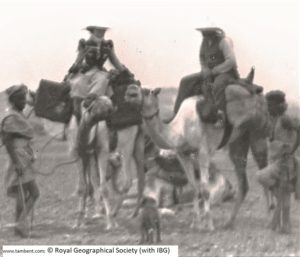
Mrs Bent, whenever it is possible, rides on horseback, and she cannot speak too highly of the intelligence and faithfulness of the horse as compared to that of a camel or mule.
Every detail concerning the outfit and internal economy of their expeditions is left by Mr Theodore Bent to his wife, and so on her hangs the heavy responsibility of keeping in health and making comfortable a larger or smaller party, which often includes guides and servants belonging to the country which is to be explored.
Like most travellers, this lady has found that the less she and her nomad husband see of spirits and wine the better, and so with the exception of a little brandy for medicinal purposes, the whole party travel on tea, beef essence, and condensed milk, while quinine is the most important item of the medicine chest.
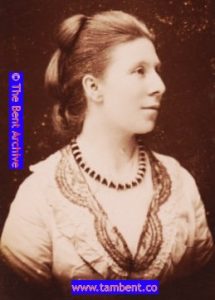
It should not, however, be thought that Mr and Mrs Bent spend their whole life in travelling through wild and inaccessible regions; they generally pass the season in their delightful London home, which is a veritable museum, full of curious and beautiful things gathered together during the course of their owners’ many expeditions. Mr Theodore Bent has generously presented many of his most precious archaeological finds to the British Museum, but his own store is extremely valuable and curious. Mrs Bent makes a point of collecting anything specially feminine in the way of ornaments or habilaments, and some of the shawls and face veils presented to her by Arabian magnates throw a strange light on the manners and customs of the East.
The subject of our sketch was at one time proposed for election to the Royal Geographical Society, but she little values official recognition of dignities, and the matter has remained in abeyance note 3 .”
Notes
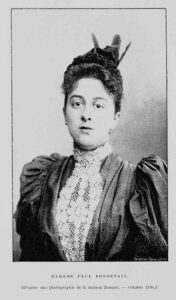
Return from Note 1
Return from Note 2
Return from Note 3
 Leave a comment or contact us about this article
Leave a comment or contact us about this article